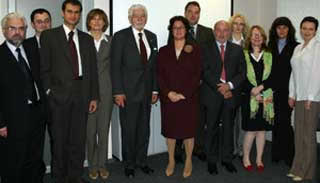
Репортаж
Addressing AIDS challenges in Belarus
25 октября 2006 года.
25 октябрь 200625 октябрь 2006

(Left to right) Mr. Sergei Martynov, Minister of Foreign Affairs of the Republic of Belarus; Professor Lars Kallings; Dr. Vassiliy Zharko, Minister of Health of the Republic of Belarus.
In less than a decade, numbers of new infections have increased twenty-fold in Eastern Europe and Central Asia. The country of Belarus is no exception. Although estimates of people living with HIV may seem low at around 20,000 adults and children, and there are signs of some progress, the spread of HIV does not seem to be slowing.
Addressing the issue of rising infection rates and the need for greater awareness on HIV in Belarus UN Secretary General’s Special Envoy on HIV/AIDS in Europe Professor Lars Kallings from Sweden paid a high level advocacy visit to the country in October 2006.
During the visit Professor Kallings met with key Belarus officials including Mr. Sergey Martynov, Minister of Foreign Affairs, Dr. Vasilij Zharko, Minister of Health, Dr. Victor Kolbanov, First Deputy Minister of Health. He also met Dr. Mikhail Rimzha, Deputy Minister of Health & Chief Sanitary Physician, Dr Ludmila Postoyalko, Chairperson of the Standing Committee for Demographic Security and Social Development of the National Assembly Council.

Professor Lars Kallings meets with the UN Country Team
“In the course of my visit I urged political leaders to step forward and to talk openly about AIDS. I speak for the strengthening of partnerships with civil society organizations to ensure universal access to HIV prevention, treatment and care,” Professor Kallings said.
Learning of the various aspects of the AIDS response in Belarus, Professor Kallings praised progress achieved so far, including reaching out to more young people with HIV prevention messages and ensuring that three quarters of mothers living with HIV and their newborn babies underwent a complete course of antiretroviral prophylaxis in 2005. Professor Kallings also noted that antiretroviral treatment is integrated into health care systems and has been scaled up to reach 80 per cent of those in need by mid 2006.

Professor Lars Kallings speaks at a press conference during his visit to Belarus
As part of the visit, Professor Kallings also met with the UN country team, visited the AIDS Prevention Department of the National Center of Hygiene, Epidemiology and Public Health (which serves as a Secretariat of the Republican Interdepartmental Council on HIV/AIDS and STDs Prevention) and met with representatives of civil society organizations and people living with HIV who are involved in the country’s multi-sectoral response to the epidemic.
“With continued political commitment and increased HIV prevention and treatment programmes, Belarus has a window of opportunity to keep prevalence rates low and to reverse the epidemic,” said Dr Sergei Furgal from UNAIDS European Regional Support Team in Geneva.
Photo Credits : UNAIDS

